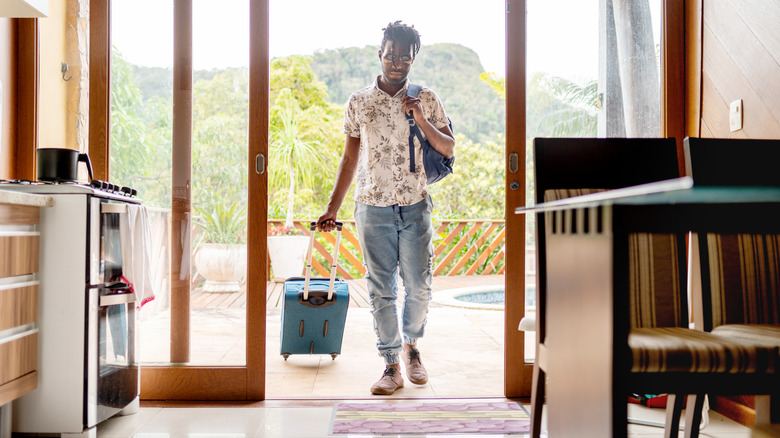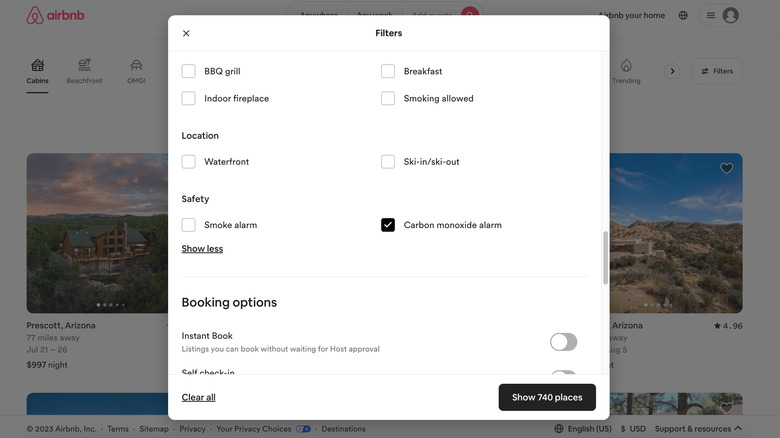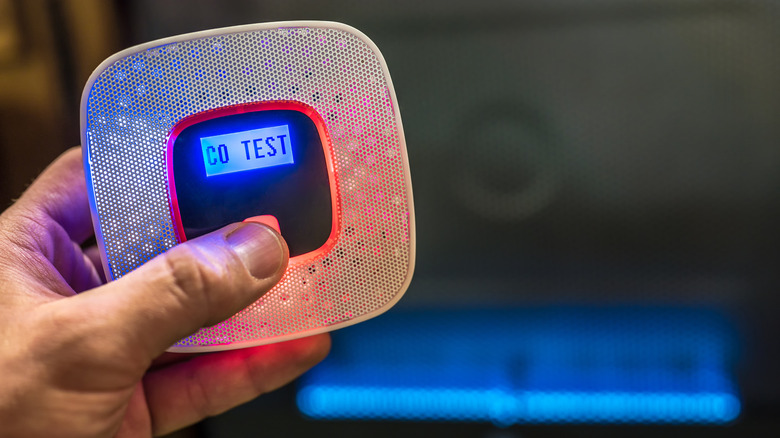The One Thing You Shouldn't Forget To Check When You Get To Your Airbnb
Feeling safe at your Airbnb is of the utmost importance for guests, but there might be one safety device you're overlooking. When you think of safety during your stay, your first thoughts are usually about the deadbolt on the front door, the windows locks, security systems, and finding the fire extinguisher. However, there is one piece of safety equipment that might easily escape your notice if you don't know to look for it — a carbon monoxide detector.
Carbon monoxide (CO) is known as the silent killer. This is due to the fumes being invisible and odorless, making it very difficult to detect until household members begin to feel the side effects of CO poisoning. As such, these tiny but powerful devices are literally lifesavers, keeping families and pets safe from the dangers of CO fumes.
Unfortunately, not all accommodations come equipped with these devices. This can lead to tragic accidents, such as when three American tourists died in 2022 at a resort in the Bahamas from carbon monoxide poisoning. With that being said, you can get some peace of mind and prevent carbon monoxide poisoning when you book a stay with Airbnb.
Airbnb makes it easy for guests to stay safe
Carbon monoxide leaks and poisonings are most common in places that have fuel-burning appliances, according to the Minnesota Department of Health. As such, leaks are most commonly found in homes and buildings with older gas-powered appliances like furnaces, boilers, gas ranges, and water heaters. So, if you're searching for an Airbnb and you think you'll be staying in an older accommodation where there would be these kinds of heating devices (such as in cooler climates), you'll want to consider looking for places that have carbon monoxide detectors noted in the listing.
Before you book your stay, be sure to reach out to the host and ask if there are detectors on each floor of the accommodation. This is especially important if you have small pets and children, as they are more quickly affected and more susceptible to the effects of CO poisoning.
If the listing doesn't indicate there is a detector, feel free to ask if there is one in case they just didn't list it. If not, inquire if they have any appliances that use gas. In more modern homes, it's common to find electric water heaters and stove tops, which minimizes the risks of CO leaks.
If you're still worried, here are a few ways to detect carbon monoxide leaks
Unfortunately, technology isn't perfect, and even detectors can fail to catch a CO leak. So, even if you're staying somewhere with carbon monoxide detectors, you should still know the warning signs of a potential CO leak in your accommodation.
If there is a gas furnace or cooking range, check that the flames are blue, not orange or yellow. Excessive condensation and moisture on windows, walls, and cold surfaces may serve as a warning sign for a possible carbon monoxide (CO) leak. The symptoms of CO poisoning are similar to a cold or flu. This is the dangerous part of CO poisoning since you might go to bed to sleep it off, especially after a day of travel, which can result in loss of consciousness and even death.
However, you can tell the difference between CO poisoning and the flu if everyone in the house is falling ill at the same time, you feel better when you spend time away from home, and you don't have any other symptoms of the flu such as a fever, swollen lymph nodes, or body aches.
If you're concerned there might be a leak, go outside immediately and call the fire department. Then contact your host to let them know, as well as Airbnb. According to one Redditor in the subreddit r/AirBnB, you might be able to receive a partial refund as well as a credit for a local hotel.


